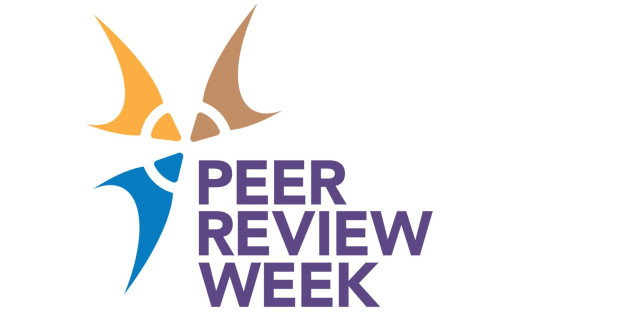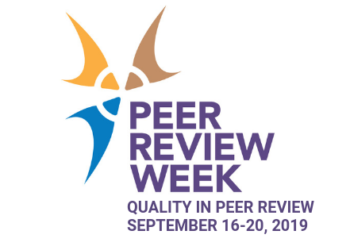For many of us, it’s difficult right now to look even one week ahead, never mind several months. But one thing you can count on is this year’s Peer Review Week, which will take place as usual during the third week of September, from 21st – 25th (full disclaimer, I have been involved with Peer Review Week from its start, and am on the 2020 Steering Committee). Luckily it is always a largely — if not entirely — virtual affair, with most of the action taking place via webinars and other online events, as well as in blogs and other e-publications, including our traditional week of posts here onThe Scholarly Kitchen, edited by fellow chef Karin Wulf and myself. Last year, for the first time, we also experimented successfully with Reddit, so you can expect to see more happening there too.

Not only is the format of Peer Review Week appropriate for today’s world, but this year’s theme — trust — is also especially relevant to the times we find ourselves in. After years, if not decades, of populist politicians decrying the value of experts, defunding research, and denying its findings, COVID-19 has started to turn the tide. To be fair, the public, for the most part, has continued to trust in science — far more than they do in politicians! — and that trust is increasing. According to the Pew Research Center, even before the current crisis, the percentage of Americans who said they have a great deal or a fair amount of confidence in scientists increased from 76% in 2016 to 86% in 2019, with the percentage of those with a great deal of confidence increasing by 14 points, from 21% to 35%. Interestingly enough, this has happened during a time when the US administration’s support for science was under unprecedented attack… Now, even some of those persistent science deniers are having to rethink their opinions — albeit sometimes erratically — and, call me Pollyanna, but I hope and believe that, in combination with the public’s continued and overwhelming support for science, we may see some much-needed changes in the months and years to come.
But getting back to Peer Review Week, what does trust in peer review mean in today’s world? There are so many ways to approach this question, and we hope that this year’s celebrations of the central role of peer review across all forms of scholarly communication will shine a light on many of them.
For example, ensuring that early career researchers, and others who don’t have experience of peer review, receive the education and training they need on what it is, why it’s important, and how to do it. This is likely to be especially important in disciplines where COVID-19 is impacting the volume of research being published — and being published more quickly — like epidemiology, pulmonology, and cardiology, not to mention economics, finance, social care, and more. The experts interviewed for this Science article about the surge in COVID-19-related articles are currently being asked to peer review up to 20 articles a week, compared with one or two a year. Reviewer burnout has got to be a risk here and, as Andrew Ward of the Scripps Research Institute says in the article, when the established experts such as himself can’t review a coronavirus manuscript, journals “have to go down the food chain to people with lesser experience or no experience in coronaviruses.” Those people need to be well trained and supported in order to maintain trust in the peer review process.
Preprints are likely to be another area of focus for this year’s Peer Review Week. They enable rapid and open publication, as well as the opportunity for informal community review and commentary, both of which are valuable in our time of crisis. However, they also allow bad — potentially dangerous — information to be disseminated. According to this Science article, even the renowned Anthony Fauci says of preprints: “It gets a little confusing what you can really believe.” Imagine how much harder it is for journalists and the general public… Most major preprint servers now have prominent notices that emphasize “the preliminary nature of the information in preprints.” On the plus side, preprints are also enabling that bad information to be shot down quickly, and publicly. And, as NEJM Editor-in-Chief Eric Rubin, notes in the same article: “for now, physicians are dealing with a crisis and the best quality information available quickly is better than perfect information that can’t be accessed until it’s not helpful.” I’m sure there will be plenty of debate about trust in preprints during Peer Review Week!
A final example of what I hope this year’s focus on trust will highlight is the perennial issue of transparency, including transparency around bias and potential bias. This was a Peer Review Week theme in its own right in 2017 and is a major component of trust. Karin and I wrote about the issue from the perspective of fake news and “alternative” facts, both of which were relatively new concepts back then. Now, sadly, they have become part of our day-to-day reality, with the Washington Post reporting in January that, in his first three years as President, Donald Trump made 16,241 “misleading or false claims.” The need for trust in peer review, built on transparency (though not necessarily openness) around the processes and demographics, has never been greater.
This year’s Peer Review Week Steering Committee is being led by Phil Hurst, Publisher at the Royal Society, and Lou Peck, MD and Founder of The International Bunch with the support of 50+ individuals representing 30+ organizations — journal and book publishers, societies, industry organizations, vendors, funders, and more. Planning is now starting in earnest and it’s not too late to volunteer to get involved; just email us at peerreviewweek@outlook.com. Even more importantly, we’d love you and your organization to participate in this year’s celebrations! You can get a sense of what’s happened in previous years on the Peer Review Week website (check out the archives for each year), and we encourage you to think creatively about how best we can collectively debate, educate, and inspire our community to engage with us on the timely topic of trust — and to share your plans so that we can help promote your activities. Thank you!
Discussion
1 Thought on "In Peer Review Week We Trust"
It’s really good and exciting to hear about the theme of Peer Review Week 2020. No Doubt the Peer Review Committee has done a great job last year in bringing up the latest trends to maintain quality in Peer Reviews and engaging a diversified audience on one platform. The choice of this year’s theme is excellent and the fundamental tool booth in business & science. I am hoping a lot more to explore and learn during PRW2020.
Good Luck!


